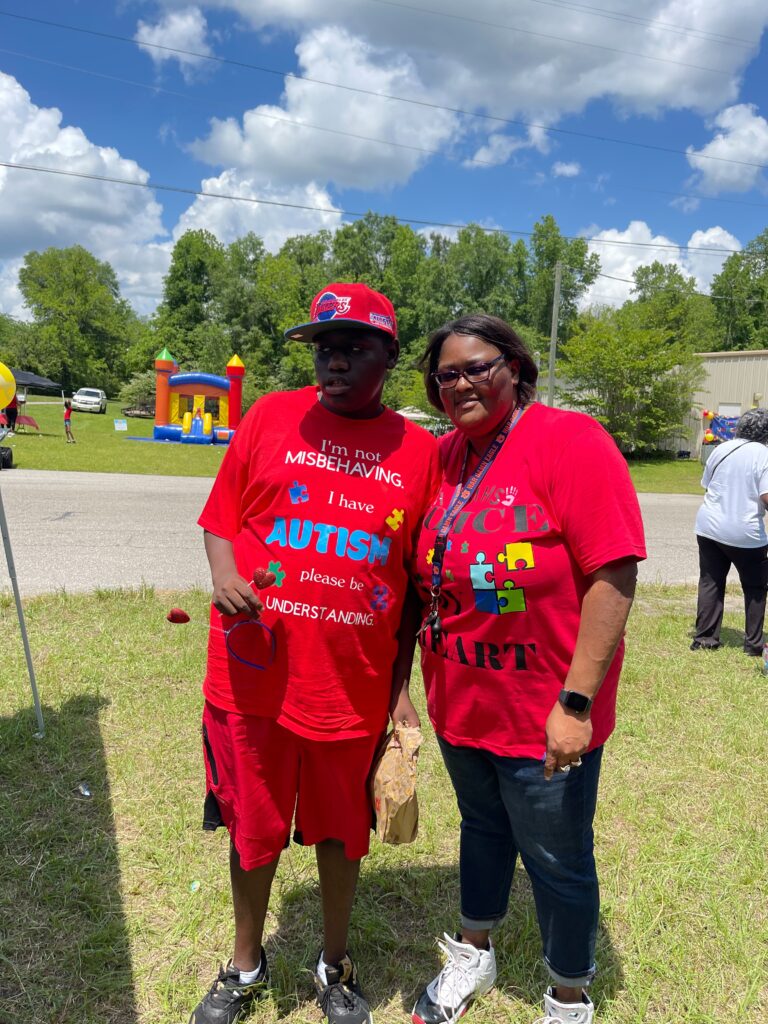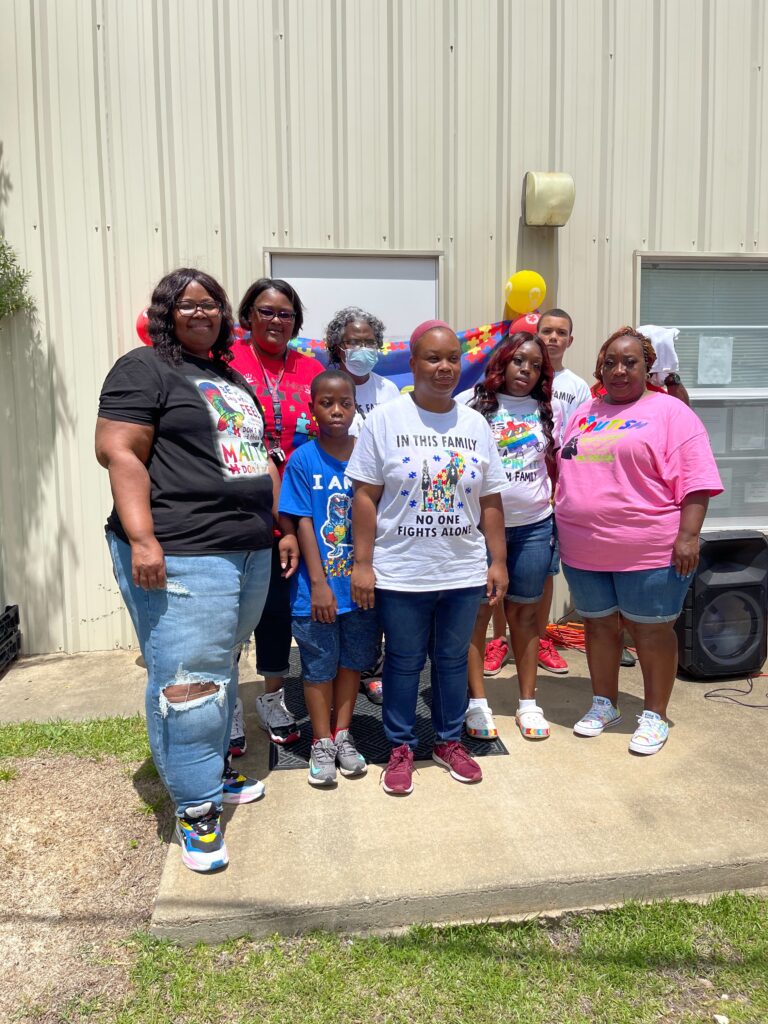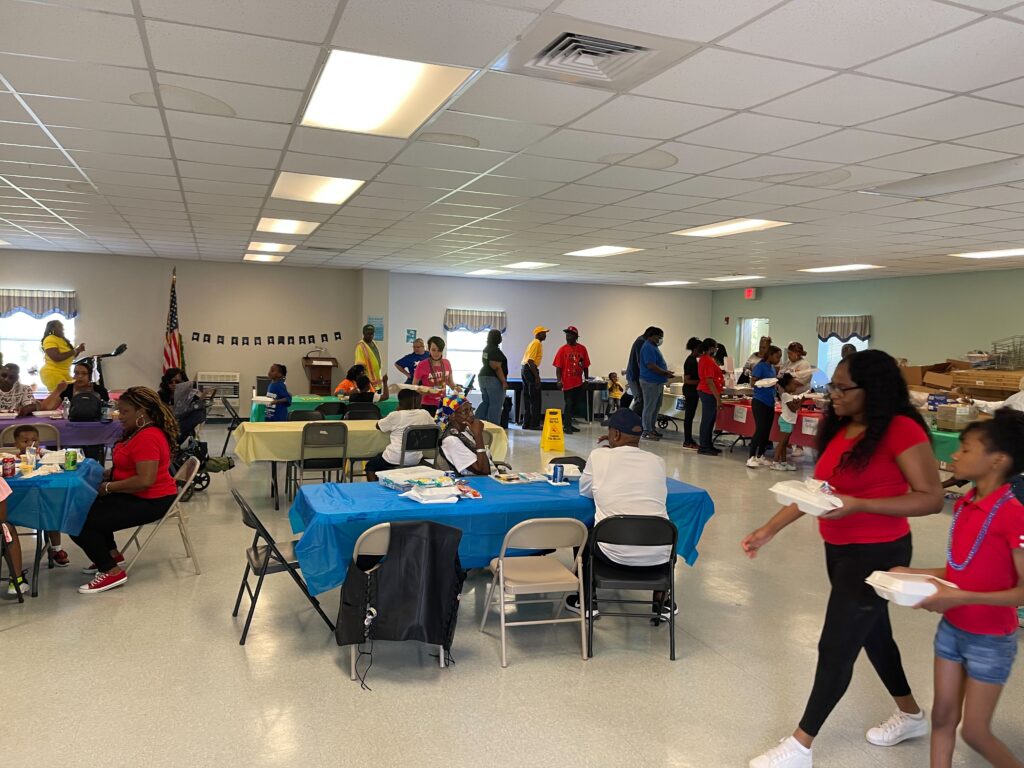April 17, 2023
– By Erica Cunningham –
Raising a child with autism spectrum disorder (ASD) comes with unique challenges. But how does this experience change based on where you live? Residing in a rural area can add greater obstacles to raising a child with ASD. Greater distances between family members and resources as well as several other factors specific to rural areas can produce higher risks of delayed diagnosis, resulting in lower educational and functional outcomes for the children.
The costs associated with traveling great distances to get to these necessary resources can deter families from seeking services, ultimately hindering the development of their child with ASD.
ENI Community Liaison Kimberly Foster-Young shares her experiences of raising her son with ASD in rural Midway, Alabama, as well as how she has been able to uplift local families going through similar experiences. Her son Ke’Morris, also known as Keymo, was diagnosed with autism spectrum disorder when he was three years old. Kimberly describes this as a very hard time, but despite her struggle, Kimberly has brought people together and built a community with other families who are also raising children with ASD.
Midway, Alabama, is a small town located in eastern Bullock County. And by small, we mean small. At the 2021 Census, the population was only 420. The town has one elementary school.
“The journey with my son has not been easy,” Kimberly said. She explained how the rural school system cannot give Ke’Morris the resources he needs, so she works with him one-on-one at home. While he has great teachers and aids, the classrooms are small and overcrowded.

In addition to her responsibility for her son’s education, she also must regularly travel three hours out of town to provide her son with the specialists and medications they lack closer to home. This is a universal challenge that many people living in rural areas all over the U.S. face when raising children who need special accommodations and care. Rural settings often have less availability of services per capita, as well as low socioeconomic status and education levels. Families often must travel to nearby cities, counties, or even states to seek care for their children. The costs associated with traveling great distances to get to these necessary resources can deter families from seeking services, ultimately hindering the development of their child with ASD.
When Kimberly first found out about Ke’Morris’ diagnosis, she knew the first step she needed to take was to educate herself. “I live in a community where no one knows what autism is,” said Kimberly. With a prominent stigma surrounding ASD in Kimberly’s community, people were negatively labeling Keymo, placing him in a box where he did not belong.
Breaking the stereotypes pinned against him in his town, Ke’Morris displays his unique intelligence through his ability to communicate through music. While Keymo is nonverbal, he communicates his emotions through singing or playing certain songs. If he is happy, he will play an upbeat song. If he is feeling down, he may play or sing a more melancholy song.
Ke’Morris is a shining example that children with ASD are normal kids who sometimes need a little extra love and accommodations. Kimberly has taken steps to educate her community throughout her journey with Keymo, and the community has been open to learning more. But with limited initial resources, Kimberly knew she first had to equip herself with all the tools she would need to help her son succeed.

As Kimberly began to learn more about autism spectrum disorder, she also found ways in which she could become more involved in the ASD community. Autism Support of Alabama is an organization with a vision to have every individual with autism be understood, be accepted and supported in all community spaces.
After much research, Kimberly became inspired to reach out to Autism Support of Alabama in hopes of bringing a part of the organization to Bullock County to offer more support to the families of children with autism in her local area. Soon the Bullock County Autism Society, a partner of Autism Support of Alabama, came to be.
Kimberly described the Bullock County Autism Society as a small group of parents from Bullock and Barbour counties who have children with different types of autism. They strive to improve the community’s outlook on the meaning of autism by working together to educate local citizens about ASD. We hope to “empower the lives of our children of all ages with autism and their families,” Kimberly said.
As the founder and president of the Bullock County Autism Society, Kimberly works to advance the group’s mission by traveling to schools and churches in her area to educate her community about autism. She creates a safe space for people to ask questions, and Kimberly loves to share stories about her son, Ke’Morris, and use him as an example to inform others about ASD. And Kimberly stays busy spreading this information. Within the month after we spoke with Kimberly, she had plans to travel to over four schools and two churches and to extend her travels into Barbour County!
I have seen positive changes in my community. More people want to learn more about autism and ways to get to know the children.
Kimberly Foster-Young
In addition to challenging community perspectives with these educational talks, the Bullock County Autism Society hosts the Riding 4 Autism fundraiser every year in downtown Midway to raise money and awareness in the community. Car and motorcycle clubs from different communities come together and begin their journey in Birmingham. They travel southeast towards Bullock County, picking other riders up along the way in Montgomery and Union Springs.
They end their travels with a parade for the Midway community to kick off the rest of a fun day. They offer face painting, food and inflatables while providing a safe place and time for the citizens of Midway to get to know the ASD community and raise awareness about autism spectrum disorder.

The proceeds of Riding 4 Autism are used by the Bullock County Autism Society to provide resources to families in the community. Gas cards and meal cards are great assets for families who must travel out of town to access their children’s resources. Part of the funds also goes towards planning trips for the children with autism in the community. Kimberly emphasizes the importance of offering the kids real-life experiences in public and giving them an opportunity to interact with more people.
Autism Awareness Month starts April first. Get to know someone with Autism. Show love and kindness to someone with Autism. Let them know they are appreciated.
Kimberly Foster-Young
Kimberly ties the Equitable Neighborhoods Initiative into her work with the ASD community by teaching the kids how to stay healthy through the activities she does with them. She teaches the children and their families the connection between leading a healthy lifestyle and managing symptoms of ASD. Eating healthy and exercising daily can help the children focus longer and avoid other health issues.
There are many resources for people in Alabama who have a disability. In the video below, Ms. Crystal Smith, Outreach Coordinator for Auburn University’s College of Education, overviews resources and services in Alabama for individuals with disabilities. Ms. Smith also links to helpful resources.
Through her work in the Bullock County Autism Society, Kimberly has seen great strides in her community. “I have seen positive changes in my community. More people want to learn more about autism and ways to get to know the children” Kimberly said.
“Autism Awareness Month starts April first. Get to know someone with Autism. Show love and kindness to someone with Autism. Let them know they are appreciated,” Kimberly exclaimed. The month of April is a great time to educate yourself on ASD through reading, watching YouTube videos, and even just getting to know someone with autism.
To learn more about Autism Support of Alabama, you can visit their website at www.autism-alabama.org.



